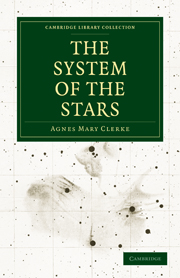Book contents
- Frontmatter
- PREFACE
- Contents
- ILLUSTRATIONS
- ADDENDA
- CHAPTER I THE TASK OF SIDEREAL ASTRONOMY
- CHAPTER II THE METHODS OF SIDEREAL RESEARCH
- CHAPTER III SIRIAN AND SOLAR STARS
- CHAPTER IV STARS WITH BANDED SPECTRA
- CHAPTER V GASEOUS STARS AND NEBULÆ
- CHAPTER VI SIDEREAL EVOLUTION
- CHAPTER VII TEMPORARY STARS
- CHAPTER VIII VARIABLE STARS OF LONG PERIOD
- CHAPTER IX VARIABLE STARS OF SHORT PERIOD
- CHAPTER X THE COLOURS OF THE STARS
- CHAPTER XI DOUBLE STARS
- CHAPTER XII VARIABLE DOUBLE STARS
- CHAPTER XIII STELLAR ORBITS
- CHAPTER XIV MULTIPLE STARS
- CHAPTER XV THE PLEIADES
- CHAPTER XVI STAR CLUSTERS
- CHAPTER XVII THE FORMS OF NEBULÆ
- CHAPTER XVIII THE GREAT NEBULÆ
- CHAPTER XIX THE NATURE AND CHANGES OF NEBULÆ
- CHAPTER XX THE DISTANCES OF THE STARS
- CHAPTER XXI TRANSLATION OF THE SOLAR SYSTEM
- CHAPTER XXII THE PROPER MOTIONS OF THE STARS
- CHAPTER XXIII THE MILKY WAY
- CHAPTER XXIV STATUS OF THE NEBULÆ
- CHAPTER XXV THE CONSTRUCTION OF THE HEAVENS
- APPENDIX.—TABLES OF STELLAR DATA
- INDEX
- Plate section
CHAPTER XXV - THE CONSTRUCTION OF THE HEAVENS
Published online by Cambridge University Press: 05 July 2011
- Frontmatter
- PREFACE
- Contents
- ILLUSTRATIONS
- ADDENDA
- CHAPTER I THE TASK OF SIDEREAL ASTRONOMY
- CHAPTER II THE METHODS OF SIDEREAL RESEARCH
- CHAPTER III SIRIAN AND SOLAR STARS
- CHAPTER IV STARS WITH BANDED SPECTRA
- CHAPTER V GASEOUS STARS AND NEBULÆ
- CHAPTER VI SIDEREAL EVOLUTION
- CHAPTER VII TEMPORARY STARS
- CHAPTER VIII VARIABLE STARS OF LONG PERIOD
- CHAPTER IX VARIABLE STARS OF SHORT PERIOD
- CHAPTER X THE COLOURS OF THE STARS
- CHAPTER XI DOUBLE STARS
- CHAPTER XII VARIABLE DOUBLE STARS
- CHAPTER XIII STELLAR ORBITS
- CHAPTER XIV MULTIPLE STARS
- CHAPTER XV THE PLEIADES
- CHAPTER XVI STAR CLUSTERS
- CHAPTER XVII THE FORMS OF NEBULÆ
- CHAPTER XVIII THE GREAT NEBULÆ
- CHAPTER XIX THE NATURE AND CHANGES OF NEBULÆ
- CHAPTER XX THE DISTANCES OF THE STARS
- CHAPTER XXI TRANSLATION OF THE SOLAR SYSTEM
- CHAPTER XXII THE PROPER MOTIONS OF THE STARS
- CHAPTER XXIII THE MILKY WAY
- CHAPTER XXIV STATUS OF THE NEBULÆ
- CHAPTER XXV THE CONSTRUCTION OF THE HEAVENS
- APPENDIX.—TABLES OF STELLAR DATA
- INDEX
- Plate section
Summary
Sir William Herschel conceived it to be the supreme object of astronomy ‘to obtain a knowledge of the construction of the heavens;’ and this, in his view, would be accomplished by the ‘determination of the real place of every celestial body in space.’ Thus limited, the problem would be completely solved could the absolute distance be ascertained of every object telescopically or photographically discernible in the sky. But even the attainment of this unattainable point would never have satisfied Herschel's restless spirit. The real scope of his inquiries went far beyond it. They had an historical, as well as a statistical aim. ‘Looking before and after,’ they embraced the past and future, no less than the present of the Cosmos.
Modern investigators are of the same mind. The heavens are regarded by them from a physiological, rather than from a purely anatomical point of view. Mere knowledge of structure, however accurate, will not content them. The vital functions of the organism, the mutual dependence of its parts, the balance of internal forces tending towards destruction and preservation, the dimly-apprehended aim of its divinely sustained activity, engage their eager attention. The heavens live and move, and the laws of their life and motion involve the material destiny of man. It is impossible that he should be indifferent to them.
Even, however, if our instinctive interest in the working of the machine were less keen, we should be driven to search out the dynamical relations of its parts by the impossibility of otherwise arriving at a true knowledge of their geometrical relations.
- Type
- Chapter
- Information
- The System of the Stars , pp. 379 - 398Publisher: Cambridge University PressPrint publication year: 2010First published in: 1890



